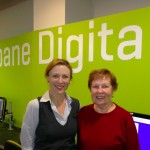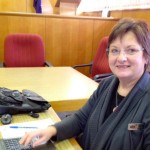
Across the country Australians are being offered free tools and training to help them get online.
Think about all the things you do in a day – both at work and at
home – that involve using digital technology. You send emails with attachments, you post photos and share news with family and friends on social media, you check the weather, look up recipes, you might do banking, book holidays or apply for jobs online. You might also participate in online learning, pay your council rates online or access health services on the internet.
Digitally disadvantaged Australians
But for many Australians these are not skills that they can take for granted. These are the digitally disadvantaged – people on the other side of the digital divide.
According to a 2010–2011 report by the Australian Bureau of Statistics, approximately 21 per cent of Australians do not use the internet and this figure increases to 63 per cent for people aged over 65.
Kaet Lovell, Assistant Director of the Digital Policy Section in the Federal Government’s Department of Communications says that the digital divide is not just an age issue. ‘Adults who left school before 2000 when computers were introduced in classrooms, people who have had no need to use computers in their jobs, and stay-at-home parents – are all people for whom computers have just not been part of their world.’ The high income and highly literate can be just as vulnerable to digital disadvantage, Kaet says. But some groups including people with disabilities, are doubly disadvantaged.
Kaet says the cost of not participating in the digital world can be high. People with little or no digital literacy have unequal access to services and information.
‘Social inclusion means having access to government services and by 2017 all major government services and interactions with individuals will be online.’
The Australian Government offers a number of free tools and resources to help Australians get online and make the most of the internet – safely and confidently.
The Internet Basics website (now closed) and the Digital Hubs program aim to increase the number of Australians who use the internet and to train those people at risk of being left behind in using digital technology. Internet Basics offers online help in learning to use the internet safely and easily and to increase awareness of the benefits of being online.
Digital hubs are operated by 40 community organisations around Australia including councils, libraries, community centres and neighbourhood houses. They offer free individual and group training to local community members.
TRAINER’S STORY: Trish, Adelaide Hills Digital Hub
Trish joined the Adelaide Hills Digital Hub team in February 2013 and thoroughly enjoys her role. ‘The most rewarding thing about working for the Digital Hubs program is the ability to help people resolve their frustrations with technology, and connect with others online’, says Trish.
Helping people develop digital confidence and independence is one of the most satisfying parts of her job. ‘I push them out of the nest and watch them fly’. She has to juggle being helpful with encouraging people to develop digital problem solving skills. ‘It’s not about always knowing all the answers—it’s fun to teach people how to find answers.’
With her teammates, Trish plans training that is relevant to the needs of their community. ‘It can get very cold during winter in the Hills, so there are lots of people who travel to escape the cold. We have sessions that teach people how to book travel, stay in touch with their family while they are away, and then how to edit their photos when they return.
You can watch a short video about the Adelaide Hills Digital Hub on YouTube.

Jane and trainee at Brisbane Digital Hub.
TRAINER’S STORY: Jane, Brisbane Digital Hub
Jane says, ‘We have a lot of different cultures and quite a large Chinese population. We are fortunate that the Sunnybank Library already offers courses in Cantonese and are lucky to have a Cantonese-speaking staff member, who will assist with the Digital Hub training.’
As the Digital Hub trainer, Jane finds showcasing technology exciting. She says, ‘I love that light-bulb moment – the ‘aha!’ when you know people really understand something they have never understood before’.
TRAINEE’S STORY: Shirley, Scottsdale Digital Hub, Tasmania
Shirley is the owner of a local Art Gallery Café in Scottsdale, northeast of Launceston, Tasmania. She took a variety of Digital Hub training sessions, including group and one-on-one sessions on file management, Outlook, and Facebook pages for business. She has since set up a Facebook page for the art gallery café and posts content every day. She says, ‘The Facebook page is a great way to market the products available in the art gallery and café as soon as they are available.’
 Shirley says she has noticed new people liking the page when she
Shirley says she has noticed new people liking the page when she
began posting content more regularly. ‘It is hard to know whether people are coming in because they have seen us online, but we are now getting about 50 to 60 people come through the café daily, which is probably about a third more than last year.’
Sending out invitations to her customers was a time-consuming
manual task. Learning how to set up a contact list in Outlook has saved her time and effort. ‘instead of folding letters and putting them in envelopes and posting them, I send them out over email with the click of a button.’
TRAINEE’S STORY: Joan Henderson, Victoria Park, WA
One of Joan’s relatives suggested the Digital Hub as a way of improving her limited computer knowledge. Joan learnt how to use Facebook, and a range of IPhone apps. She can now monitor her diabetes online, which has helped her feel more in control and less stressed about her health. She also has more regular contact with her family through email and social media.
